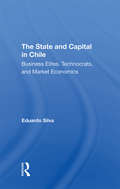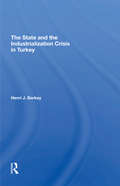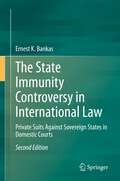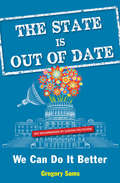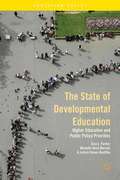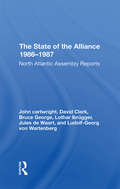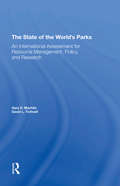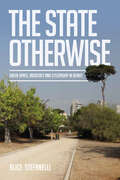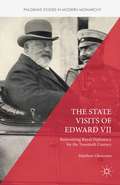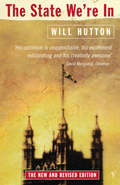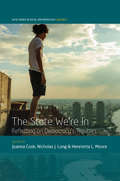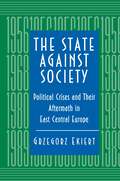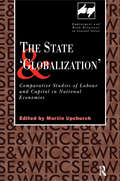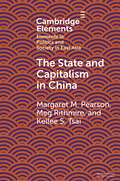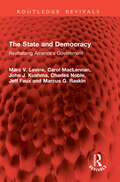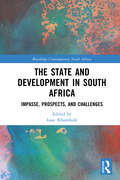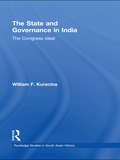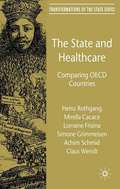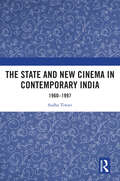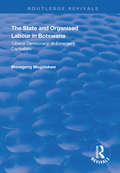- Table View
- List View
The State And Capital In Chile: Business Elites, Technocrats, And Market Economics
by Eduardo SilvaChile emerged from military rule in the 1990s as a leader of free market economic reform and democratic stability, and other countries now look to it for lessons in policy design, sequencing, and timing. Explanations for economic change in Chile generally focus on strong authoritarianism under General Augusto Pinochet and the insulation of policymakers from the influence of social groups, especially business and landowners. In this book Eduardo Silva argues that such a view underplays the role of entrepreneurs and landowners in Chile's neoliberal transformation and, hence, their potential effect on economic reform elsewhere. He shows how shifting coalitions of businesspeople and landowners with varying power resources influenced policy formulation and affected policy outcomes. He then examines the consequences of coalitional shifts for Chile's transition to democracy, arguing that the absence of a multiclass opposition that included captialists facilitated a political transition based on the authoritarian constitution of 1980 and inhibited its alternative. This situation helped to define the current style of consensual politics that, with respect to the question of social equity, has deepened a neoliberal model of welfare statism, rather than advanced a social democratic one.
The State And The Industrialization Crisis In Turkey
by Henri J BarkeyThis book re-evaluates the politics of the maligned industrialization strategy and examines Turkey's attempts to implement it in the 1960s and 1970s. It argues that Import Substituting Industrialization itself is not responsible for the failure of Turkey's industrialization efforts.
The State Courts
by Robert A. Carp Kenneth L. Manning Ronald C. StidhamIn this new adaptation from their classic Judicial Process in America, Carp, Stidham, and Manning provide a comprehensive look at state judicial systems. They place the various state court systems within the overall political and judicial framework and examine recent events in, and policymaking by, state courts.
The State Governor (U.S. Government)
by Martha E. RustadWhat does a state governor do? Learn about the duties of a state governor, who can be a state governor, where they work, and how state governors are elected. Descriptive main text, full-color photos, fast facts, and callout definitions work together to support understanding.
The State Immunity Controversy in International Law: Private Suits Against Sovereign States in Domestic Courts
by Ernest K. BankasThe author shows through a careful analysis of the law that restrictive immunity does not have vox populi in developing countries, and that it lacks usus. He also argues that forum law, i.e. the lex fori is a creature of sovereignty and between equals before the law, only what is understood and acknowledged as law among states must be applied in as much as the international legal system is horizontal.
The State Is Out of Date: We Can Do It Better
by Gregory Sams&“A humorous and at times brutally honest overview on many of the problems . . . that we presently endure through our political and cultural divide.&”—Robert Steven Thomas, author of Intelligent Intervention As disillusioned citizens across the planet take to the streets, do you wonder if the world&’s nation states will ever get it right? Does anyone really think that politics is working—aside from those in power and behind it? What if living together in peace and harmony is a more natural condition than what we experience in today&’s conflict-driven culture? We are community animals with built-in empathy, good at organizing things and helping each other out. The most essential and reliable features of our culture arose without top-down planning by a state that has one basic objective—to stay in power. We have enjoyed enduring civilizations in the past governed wholly from the bottom-up, without need of a shepherd and sheepdogs. We can do it again and are more connected than ever before. The State Is Out of Date reassures us that politics is not even the primary game in town, though it sometimes may seem like the only one. It is a book for all those who wonder why politics isn&’t working and what would. &“A book of immense importance that also happens to be immensely readable. Get it now, read it now. You&’ll be amazed, impressed, persuaded, infuriated and filled with hope for a future that awaits us if only we are prepared to make the right choices.&”—Graham Hancock, New York Times bestselling author of America Before &“Gregory Sams is a prophet of conscience.&”—Lanny Cotler, film writer and director
The State Of Developmental Education
by Tara L. Parker Michelle Sterk Barrett Leticia Tomas BustillosThe State of Developmental Education is the first book to provide a thorough, comparative picture of how developmental education is carried out at higher education institutions and investigate how different state-level policies and priorities change the availability, types, and quality of developmental education available.
The State Of The Alliance 1986-1987: North Atlantic Assembly Reports
by John Cartwright Lothar Ibrugger Jules De Waart Ludolf-Georg Von WartenbergOriginally published in 1987. Leaders of NATO countries are continually faced with the need for highly accurate information on complex issues such as arms control, nuclear strategy, electronic warfare, ABM compliance, SDI, terrorism, economic cooperation, East-West relations, and diverging public opinion. To provide ongoing analysis of these issues, the North Atlantic Assembly conducts extensive research, fact-finding missions, and interviews with high-level government experts. Committees then analyze the data and meet annually to present the results. The studies in this volume, which were presented to the 1986 annual session of NATO legislators, focus on the state of the Alliance. This collection provides a comprehensive evaluation of political developments within the Alliance, probes fundamental controversies underlying Alliance security, and sheds light on the aggregate of concerns surrounding the direction of arms control negotiations and the state of NATO's nuclear strategy. The book includes an appendix containing the policy recommendations that the Assembly has adopted and forwarded to the secretary general of NATO and heads of Alliance governments.
The State Of The World's Parks: An International Assessment For Resource Management, Policy, And Research
by Gary E Machlis David L. TichnellNational parks are a global phenomenon found in more than 120 countries. These parks are as diverse as the physical settings and cultural patterns of the many nations that have established them, yet within each country they serve as part of the cohesiveness that binds people together. Parks reflect-and help create-people's pride and love for their national heritage.
The State Otherwise: Green Space, Citizenship and Advocating for the Public in Beirut
by Alice StefanelliThe city of Beirut is increasingly congested, polluted and suffocating. Its already limited green public spaces are under growing threat of privatisation and redevelopment. The State Otherwise examines the difficult predicament of Beirut’s public green spaces from the vantage point of the civic campaign to reopen Horsh al Sanawbar, the city’s largest public park. Analysing the relationship between neoliberal sectarianism, private interest and political action, the book asks questions about the nature of privatisation of public property, civic society’s potential to mobilise individuals and the role of public authorities in promoting the public good.
The State Visits of Edward VII: Reinventing Royal Diplomacy for the Twentieth Century (Palgrave Studies In Modern Monarchy)
by Matthew GlencrossThe State Visits of Edward VII.
The State Visits of Edward VII: Reinventing Royal Diplomacy for the Twentieth Century (Palgrave Studies in Modern Monarchy)
by Matthew GlencrossThis book explores the revival under Edward VII of the ceremonial state visit by British monarchs, showing the impact and importance of active royal diplomacy during his reign. Using the Royal Archives, memoirs and newspapers, it reveals the contribution made by the use of ceremony and public display to popular appreciation of the monarchy.
The State We're In: (Revised Edition)
by Will HuttonThe number one bestseller on the hardback list for more than six months, The State We're In is the most explosive analysis of British society to have been published for over thirty years. It is now updated for the paperback edition.
The State We're In: Reflecting on Democracy's Troubles (WYSE Series in Social Anthropology #3)
by Nicholas J. Long Joanna Cook Henrietta L. MooreWhat makes people lose faith in democratic statecraft? The question seems an urgent one. In the first decades of the twenty-first century, citizens across the world have grown increasingly disillusioned with what was once a cherished ideal. Setting out an original theoretical model that explores the relations between democracy, subjectivity and sociality, and exploring its relevance to countries ranging from Kenya to Peru, The State We're In is a must-read for all political theorists, scholars of democracy, and readers concerned for the future of the democratic ideal.
The State We're In: Washington
by Jill SevernThis book describes the structure and function of government as well as how our democratic government was created, why we should care about it and how citizens can participate. The way tribes governed themselves pre-contact and the intricate interrelationships between state, tribal and local government are included. How a bill becomes a law, how money is collected and spent, the workings of the judicial system and state agencies, etc. are also an important part of this book.
The State against Society: Political Crises and Their Aftermath in East Central Europe
by Grzegorz EkiertClassical images of state-socialism developed in contemporary social sciences were founded on simple presuppositions. State-socialist regimes were considered to be politically stable due to their pervasive institutional and ideological control over the everyday lives of their citizens, impervious to reform and change, and representative of extreme political and economic dependency. Despite their contrasting historical experiences, they have been treated as basically identical in their institutional design, social and economic structures, and policies. Grzegorz Ekiert challenges this notion in a comparative analysis of the major political crises in post-1945 East Central Europe: Hungary (1956-63), Czechoslovakia (1968-76), and Poland (1980-89). The author maintains that the nature and consequences of these crises can better explain the distinctive experiences of East Central European countries under communist rule than can the formal characteristics of their political and economic systems or their politically dependent status. He explores how political crises reshaped party-state institutions, redefined relations between party and state institutions, altered the relationship between the state and various groups and organizations within society, and modified the political practices of these regimes. He shows how these events transformed cultural categories, produced collective memories, and imposed long-lasting constraints on mass political behavior and the policy choices of ruling elites. These crises shaped the political evolution of the region, produced important cross-national differences among state-socialist regimes, and contributed to the distinctive patterns of their collapse.
The State and 'Globalization': Comparative Studies of Labour and Capital in National Economies (Routledge Studies in Employment and Work Relations in Context)
by Martin UpchurchFirst published in 1999. Routledge is an imprint of Taylor & Francis, an informa company.
The State and Capitalism in China (Elements in Politics and Society in East Asia)
by Meg Rithmire Margaret M. Pearson Kellee TsaiChina's contemporary political economy features an emboldened role for the state as owner and regulator, and with markets expected to act in the service of party-state goals. How has the relationship between the state and different types of firms evolved? This Element situates China's reform-era political economy in comparative analytic perspective with attention to adaptations of its model over time. Just as other types of economies have generated internal dynamics and external reactions that undermine initial arrangements, so too has China's political economy. While China's state has always played a core role in development, over time prioritization of growth has shifted to a variant of state capitalism best described as, “party-state capitalism,” which emphasizes risk management and leadership by the Chinese Communist Party (CCP). Rather than reflecting long-held intentions of the CCP, the transition to party-state capitalism emerged from reactions to perceived threats and problems, some domestic and some external. These adaptations are refracted in the contemporary crises of global capitalism.This title is also available as open access on Cambridge Core.
The State and Democracy: Revitalizing America's Government (Routledge Revivals)
by Charles Noble Jeff Faux Marcus G. Raskin Marc V. Levine Carol MacLennan John J. KushmaCorporate domination of public policy during the Reagan years resulted not only in increasing inequality and deteriorating living standards for millions of Americans, but in a diminution in the capacity of government to solve basic problems that are not amenable to market-oriented solutions.The authors of The State and Democracy (originally published in 1988) propose a new public philosophy for America: one which comprises communitarian values; governments at all levels which actively pursue the public interest; a participatory political culture; and a democratic, accountable process of public choice. Because of the authors’ extensive experience both inside and outside government, they offer a fresh, interdisciplinary perspective based not only on extensive research and study, but also on first-hand experience.
The State and Development in South Africa: Impasse, Prospects, and Challenges (Routledge Contemporary South Africa)
by Isaac KhambuleThis book interrogates the nexus between the state and development in post-apartheid South Africa. It highlights current problems, and suggests ways of consolidating state capabilities, improving public institutions and enhancing governance and development outcomes.Framed around developmental state theory, the book argues that the role of the state in South Africa will be fundamental for addressing the triple challenges of unemployment, poverty, and inequality. There is a growing concern that South Africa is at a development impasse, with ongoing crises in energy, infrastructure, and unemployment. The chapters investigate the role of the post-apartheid state in pursuing development and navigating a neoliberal globalised society. The book explores state capacity in all spheres of government, the relationship between politics and bureaucracy, and the role of state-owned enterprises in the country’s developmental aspirations. The book concludes by summarising the successes, challenges and lessons that have emerged over the course of the book; and anticipating future directions or possibilities for the state in South Africa’s development impasse.Bringing together leading voices in the field, this book will be an essential read for researchers of African politics, political economy and development. The book is also relevant for policymakers, students and practitioners in social sciences.
The State and Governance in India: The Congress Ideal (Routledge Studies in South Asian History)
by William F. KuracinaThis book presents an innovative investigation of the policies of the Indian Congress during the late colonial period. Departing from the existing historiography of Indian nationalism, it analyses the extent to which Congress elites engaged in processes intended to foster nation-building in India. Rejecting the long-standing premise that the Congress primarily sought to generate a national identity, the author hypothesizes that Congress elites knowingly grappled with the creation of a national governmentality. He argues that they distanced themselves from lethargic nation-building exercises and instead opted to support more practical and more feasible state-building efforts. Accordingly, this book shows that Congress elites constructed the institutions that would enable Indians to govern themselves after India’s liberation from British imperialism. It presents evidence which shows that Congress elites began to perceive themselves and their organization as an emerging post-colonial state.
The State and Healthcare: Comparing OECD Countries
by Mirella Cacace Heinz Rothgang Lorraine Frisina Simone Grimmeisen Achim Schmid Claus WendtDescribes developments in healthcare systems over nearly four decades. Combining cross-sectional studies on healthcare financing, provision and policy values with in-depth country studies of Britain, Germany and the USA, this volume is a thorough examination of the convergence toward hybrid forms of healthcare systems.
The State and Indigenous Movements (Indigenous Peoples and Politics)
by Keri E. Iyall SmithUsing the comparative historical method, this book looks at the experience of indigenous peoples, specifically the Native Hawaiians, showing how a nation can express culture and citizenship while seeking ways to attain greater sovereignty over territory, culture, and politics.
The State and New Cinema in Contemporary India: 1960–1997
by Sudha TiwariThis book examines the relationship between the newly independent Indian state and its New Cinema movement. It looks at state formative practices articulating themselves as cultural policy. It presents an institutional history of the Film Finance Corporation (FFC), later the National Film Development Corporation (NFDC), and their patronage of the New Cinema in India, from the 1960s to the 1990s, bringing into focus an extraordinary but neglected cultural moment in Indian film history and in the history of contemporary India. The chapters not only document the artistic pursuit of cinema, but also the emergence of a larger field where the market, political inclinations of the Indian state, and the more complex determinants of culture intersect — how the New Cinema movement faced external challenges from the industrial lobby and politicians, as well as experienced deep rifts from within. It also shows how the Emergency, the Janata Party regime, economic liberalization, and the opening of airwaves all left their impact on the New Cinema. The volume will be of great interest to scholars and researchers of film studies, politics and public policy, especially cultural policy, media and culture studies, and South Asian studies.
The State and Organised Labour in Botswana: Liberal Democracy in Emergent Capitalism (Routledge Revivals)
by Monageng MogalakweFirst published in 1997, this volume departs from conventional analyses of Botswana’s political economy and focuses on the second phase of Botswana’s capitalist development from 1966-1990, arguing that even in a formally liberal democratic country, the imperatives of economic growth and development in a capitalist context give rise to the state’s close supervision and control of organised labour. Taking inspiration from Marx’s theories of history, Monageng Mogalakwe examines the capitalist form of the Botswana state and its relationships with the trade unions, labour law, industrial relations, class struggle and organised labour in a period characterised by direct state intervention in the economy and in industrial relations.
